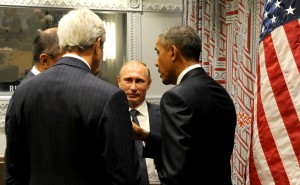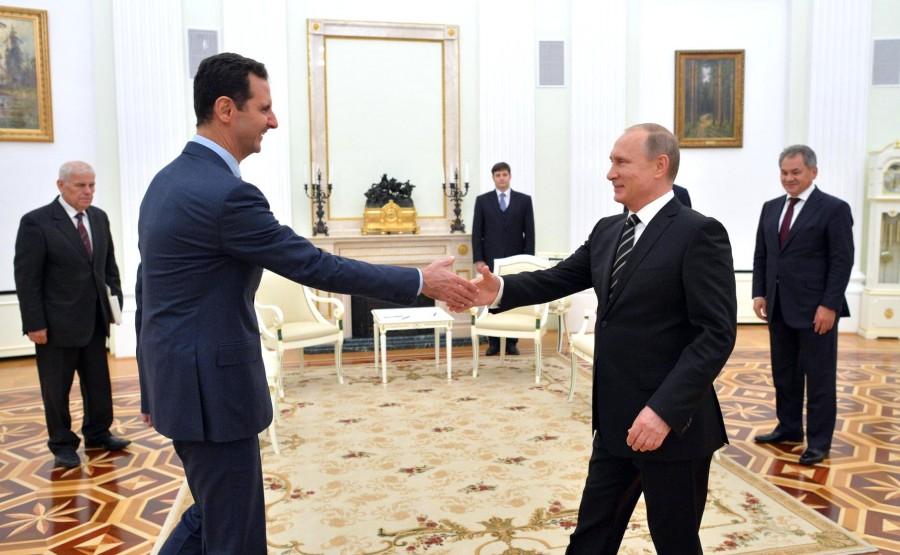Putin complicates the puzzle that already is Syria
Google image/Creative Commons license
It is difficult to decipher the relationship between Syrian President Bashar al-Assad, left, and Russian President Vladimir Putin.
As if the events in Syria are not already complicated enough, the instability has been made more complex by Russian intervention and the unclear motives of President Vladimir Putin. What might his motivation be? It’s not obvious at first glance or really at any glance.
At least one factor: Mr. Putin is a supporter of Bashar al-Assad, the current Syrian president seen by many as a dangerous despot. Mr. Assad’s leadership has been threatened by Syrian separatist fighters, but Mr. Assad is receiving aid from Mr. Putin, who may view the Syrian leader as a type of pawn; Mr. Assad’s presence also allows for Russian access to the Mediterranean.
“On the surface, Moscow seems to profit from exporting arms to Syria, and it depends on the regime’s good will to maintain Russian access to a naval facility at the Mediterranean port of Tartus,” wrote Fiona Hill, an analyst for the magazine Foreign Affairs.
The profitability of this relationship is an important aspect motivating Mr. Putin’s avid support of Mr. Assad’s presidency. The supportive relationship is accompanied by opportunities for the Russian leader to assert himself in other Middle-Eastern countries. With greater access to Central Europe, Mr. Putin can expand his Russo-European alliances and increase his influence.
After Mr. Putin’s involvement in the conflict at the Crimean peninsula, 40 intercontinental ballistic missiles were advertised as being added to the Russian military inventory. In response to this seemingly hostile behavior, the United States and the North Atlantic Treaty Organization (NATO) made the decision to place tanks on the border of NATO countries in close proximity with Russia. Mr. Putin was displeased.
“We will be forced to aim our armed forces … at those territories from where the threat comes,” Mr. Putin said in response to the decision made by the United States and NATO. It is indicative that Mr. Putin’s role in Syria probably isn’t a benign one.

President Obama faces an enigmatic foe in Russian President Vladimir Putin.
Mr. Putin experienced a radical change in outlook and tone after the tragic Paris attacks that took place on Nov. 13, showing a sudden commitment to combating the terrorist threat.
Mr. Putin seems to be challenging the United States to a game of “Who’s got more firepower?” That’s a scary thought; not many people are interested in entering a new Cold War.
Mr. Putin’s western expansion is quite frankly threatening, in and of itself, especially after the conflicts that have taken place in Crimea. There are a lot of variables that could potentially affect his motivation, and his reason for taking such a big stand in Syria. Economic and territorial reasons stand at the front of those, however.
His recent negotiations with the United States and the United Nations to combat the terrorist threat in Syria are difficult to interpret given his earlier bellicosity. Even when he’s “on our side” he seems to be a force to be reckoned with.
Bottom line, it seems he is making decisions to build international relations, but the reasons behind this diplomatic approach seem self-serving, not altruistic.
Russia, especially after controversial action in Ukraine, needs to get on the “good side” of surrounding nations. If Mr. Putin wants to push the boundaries of what’s acceptable for the country, he has to act accordingly. With his cooperation in the war against terror, people may (and this might be the hope) forget about the Crimean conflict and missile threats that have been made in the past.
It seems unlikely that Mr. Putin is participating solely out of the goodness of his heart. Surely, anyone might be capable of doing the right thing, but history cautions that this probably isn’t the deciding, or perhaps even the driving, factor for him.
In any case, Mr. Putin’s motivation in Syria cannot be entirely positive. It seems to be an opportunity for a desired expansion of Russo-European alliances that will give Russia as much power as possible.

Robert Williams, a member of the class of 2017, is a new addition to the staff of The AMSA Voice. His
academic areas of preference are biology and English...


Alfred E. Williams • Dec 18, 2015 at 9:33 pm
As one whose formative years were during the Cold War, my natural inclination is to deplore the new Russian Imperialism in the Ukraine and Central Asia, even in the present guise of supporting their ally, Bashar al- Assad. Russian imperialism in the region is not new — it has lived through two changes in form of government, back to the late 19th century, and has seen the Russians throw up their hands in Afghanistan, (a lesson from which the U.S. might have profited.) To paraphrase Santayana, those who ignore history are destined to repeat it. The Russians, the British, and we have all had ample reasons to avoid meddling in the politics of the region,
For this reason, I find myself agreeing with the anonymous State Department source who allegedly reacted to Putin’s announcement of intervention with “Knock yourself out!” Putin, whose economy is reportedly tanking for other reasons, may yet re-learn the lesson of Afghanistan by finding his foot nailed to the floor in Syria. My fear is that his attempt to retain his popularity in Russia by playing the alpha male will led him into irrational aggression if history repeats itself.
I don’t take issue with the war against ISIL — who represent Islam no more than Al Capone represented all Italian Americans. What I DO object to is using Syria as pawn in a cynical game of geopolitical chess, and I hope Putin loses enough playing pieces to figure out his error before things get out of hand.